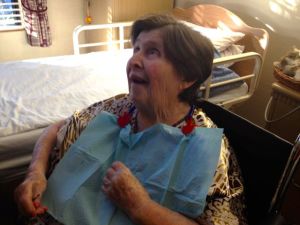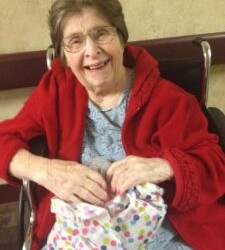by Diane Masson | Mar 22, 2015
Finding an affordable memory care or assisted living community can be a daunting task. Even this senior housing guru had to plan strategic questions before touring four memory care communities for my mother-in-law. See the questions HERE. My husband and I flew 1000 miles to Seattle. We only had two days to tour memory care communities in the Seattle area. This required researching the Internet, calling former senior housing colleagues for recommendations and scheduling tours before we left. The timing was tricky because our limited time included visiting with my husband’s mom. My husband created a spreadsheet to compare costs between these four memory care communities. The pricing is so complex that even someone working in the senior living field (like me) had trouble figuring out the monthly cost for my mother-in-law. Care points, care levels or all inclusive costs? Most assisted living and memory care communities seem to have a charge for room and board, then additional costs for care. Pricing can be very gray and feels like an illusion of smoke and mirrors. Care costs can be priced on a point system or a level system. My mother-in-law, Amy, was assessed at 223 points at her current memory care community. Care costs varied dramaticly. Some of our tour guides were actually guessing what level of care or point total she might be, before a nurse could assess her. This is what makes pricing difficult to compare. The community recommends that you to move her in and then they will figure out the monthly price. Sigh… Here were the room and board costs of four memory care communities...
by Diane Masson | Mar 15, 2015
Apparently drugging and diapering seniors in the hospital is common knowledge in higher levels of senior living care, such as assisted living, memory care and skilled nursing?!!? This is horrifying new knowledge for me. I am all about exposing dirty secrets in my new book, “Your Senior Housing Options.” So let me share what I have recently learned through my mother-in-law’s experience. My mother-in-law, Amy, has dementia and was cared for by my father-in-law for the last several years. Three days after he had a heart attack, she became psychotic. My husband and I had to hire a geriatric care nurse to help her because we live 1000 miles away. Learn more of the story HERE. It took over two weeks to get Amy admitted to the hospital (it’s a long story). Initially, we were relieved that she was going to get the psychotropic drugs she needed. Since Amy was in crisis mode, we didn’t dwell on her being diapered because of diarrhea. She’d had colon cancer 25 years ago and has self-managed her own colon care with diarrhea medications for years. Costs for Incontinence As she was in the process of transferring to a secured memory care, I was promised that they would be diligent about avoiding Amy’s trigger foods (that cause the diarrhea). My assumption was that she would surely regain continence again. This was vitally important, because incontinence can cost an additional $300 to $1,000 per month depending upon the assisted living community. My Mother-in-law Was Over Sedated We flew to Seattle to see Amy and to help find a reasonably priced memory care community for her....
by Diane Masson | Mar 8, 2015
“Your Senior Housing Options” is available now on Amazon.com. As we age, it’s never easy to face the prospect of what to do when we need living assistance. But the reality is that two-thirds of today’s seniors will eventually need long-term care, with 20 percent needing it for longer than five years. If you are a retirement-age baby boomer or senior, don’t wait for a health crisis to occur. You owe it to yourself—and your family—to plan for the future today. Although we’ve all heard horror stories, great facilities where residents are treated like gold are out there. How do you find them? You have to do your homework, ask the right questions, and look beyond the superficial to find what’s right for you. With experience as both an industry expert and a loving daughter, Diane Twohy Masson is passionate about helping seniors find the retirement community that fits their price range, lifestyle, and needs. This brand new guidebook offers a proactive approach to navigating the complex maze of senior housing options. It will help you understand the costs and consequences of the various possibilities including home care, independent living, assisted living, group homes, memory care, and skilled nursing care facilities. Order a copy of this valuable new resource by clicking HERE. A valuable source of information by someone who works in the trenches. Whether you or a loved one are currently facing challenges, or if you simply want to be prepared for what you may face in the future, this provides the necessary tools. Knowledge is power. Steve Fairfax, Currently helping my neighbor who...
by Diane Masson | Mar 2, 2015
My mother-in-law is currently in a secured memory care community. The price is very high – $6750 for 30 days of respite care. If we don’t move her within two weeks, the community fee for a permanent stay will be $10,000 and her monthly fee will be $9,000 a month. Are you kidding me? Who can afford this? She was living in her own home six weeks ago, but a crisis you can read about HERE has left her adult children scrambling to find a permanent solution for my mother-in-law. My husband, Chris, and I work in the senior housing profession, so who is better than us to evaluate the choices. We flew 1000 miles yesterday to be the experts on the ground in Seattle. We are going to visit three memory care communities today and one or two tomorrow. The best way to evaluate and compare retirement communities is in a short span of time. The crème always rises to the top. We can’t base our decision on what the community looks like, the size of the rooms or the wonderful sales person. We are going to dig deeper and ask the following questions of each memory care community: What is the staff turnover? We want to see longevity of staff – particularly in the administrator, nurse, caregivers and possibly the chef. Do the staff and residents look happy? We will talk to some of each. What will be my mother-in-laws quality of life? What programming is offered? How often does live entertainment come in the building? How will they minimize her anxiety? How many hours does the nurse...
by Diane Masson | Feb 22, 2015
Last week I shared the trauma of an adult child witnessing two parents in crisis at the same time. You can read about that here. Originally my father-in-law, Bill, had been hospitalized from a heart attack and was now going to be discharged from a skilled nursing care community. My mother-in-law, Amy, has Alzheimer’s. She had a psychotic break after her husband Bill was hospitalized and was to be released from the locked psych ward at a hospital on the same day. The local children requested that their mother’s release be postponed till they settled the dad. So we had one week to find a quality memory care community that was secure (locked so a senior with dementia or Alzheimer’s can’t wander into the street and be injured or killed). My husband and I had done our homework to find a senior living community that would be appropriate for Amy (we started our senior housing careers in Seattle). Admission requirements Admission to any senior living community usually requires the senior, family and/or the Power of Attorney (POA) to fill out paperwork to show financially responsibility, an assessment of the future resident’s medical records and an in-person interview. Coordinating an admission from the hospital My husband, Chris, and I had coordinated with a locked memory care community that had an excellent reputation and was located by a local son. It was perfect. They called us on that Monday and told us they were full. Now what? They said no worries we have a sister community who has a room. We said okay. By Tuesday night the sister community had not...
by Diane Masson | Feb 15, 2015
Aging parent’s decisions can drive us crazy or make us sick. When a parent with dementia stubbornly chooses to stay home, it can be heart breaking for the adult children. Watching a senior’s vitality fade is hard enough. But for an adult child to witness a parent’s poor hygiene, lack of nutrition by eating frozen dinners (not fresh food) and to see the absence of good judgment is tough and sad. Some of us never get sick. Yet here I am, literally worried sick about my in-laws. A month ago my father-in-law, Bill, had a heart attack. My mother-in-law, Amy, with dementia was left alone for the majority of three days and nights as the local children rallied around the dad at the hospital. They did make sure she had food and medications. My husband and I hired a geriatric nurse to evaluate and help Amy. The nurse was to be our eyes and ears, since we live 1000 miles away. By the time the nurse intervened, Amy had become psychotic and had trouble recognizing her own children. To make a long story short – my father-in-law never wanted to move to a retirement community or assisted living. He actually told my husband and I (working in the senior living business) that he understood that he would be waiting for a health crisis. Well a crisis is one parent in the hospital and we had two. Over the last month, Bill improved enough to graduate from the hospital, to rehabilitating in skilled nursing care, to living permanently with his adult daughter in her home. He was told by professionals...
by Diane Masson | Feb 8, 2015
Don’t we all know a friend or parent who fits the description of self-destructive, stubborn, selfish or stupid? What do you do? Love them or fight them? How can you help someone who refuses to believe there is a problem? You can’t make a parent be compliant with his or her doctor and you can’t force a senior to move into a higher level of care. As seniors age, medical problems tend to increase. All sorts of progressive diseases can ravage a senior’s body and create havoc mentally and physically. Uncooperative Parent? My friend Grace’s dad has been defiant about his dialysis treatments for seven years. Dialysis is a medical procedure for people whose kidneys are failing. The treatment helps clean your blood and remove toxins from the body. If you refuse treatment you die a painful death. Richard is supposed to have dialysis three times per week. His pattern of behavior is to refuse treatment till he is in crisis mode and has to be hospitalized. Then he feels good, skips a treatment, toxins build in his body, and he goes back into crisis mode again. When Richard does not show up for his dialysis, they call his adult daughter who lives 45 minutes away. She used to drop everything including walking away from work to plead with her dad to accept treatment. Sometimes her waterworks of tears would be effective and other times he still refused treatment. Crisis calls every week for seven years is a long time. Anyone of us would be burned out. The police have called my friend and threatened her with elder abuse...
by Diane Masson | Jan 18, 2015
A hoarding senior who needs a walker is not a safe combination. As hoarders age, the clutter can make a senior fall. It can be practically impossible for an emergency crew to extract a fallen senior out of living room that is piled high with paper, extra furniture and trash. I know of a senior in my former senior living community that was wedged in between tiny pathways of books, magazines, unopened mail and clothing. A friend of mine is dealing with a senior hoarding situation. Her father-in-law can only navigate through four rooms and has to climb over stuff to get into his bed. This gentleman is 98 years old with dementia and requires a walker. Recently he injured his leg on a lawn mower that was in his living room. (You can’t make up this stuff.) More trip hazards included extension cords laying on the floor and throw rugs. Whenever his son tries to get rid of stuff the dad refuses. So there are three sofas in the living room and none are accessible. The son bought his dad a new flat screen TV and VCR. The new gifts were duct taped on top of the broken TV and VCR. When the dad received a new recliner for Christmas, it was positioned next to the old run down model. Every attempt to declutter is met with an irate senior who refuses to part with anything. He should not be in this cluttery filthy home with a walker. A daughter is enabling him by bringing him groceries and medicine. There are piles of crap everywhere and you can...
by Diane Masson | Jan 11, 2015
It’s flu season and I unfortunately succumbed with a 100.8 temperature reading and a horrible cough. My husband, Chris, was sicker than I. As we nursed each other back to health, I thought about single seniors trying to manage flu symptoms alone in their home. What if a senior didn’t have enough groceries stocked at home? What if they were too weak to even make themselves a can of soup? Would they monitor their own temperature and take Tylenol every six hours? What about drinking enough liquids? Will anyone check on his or her well-being? The flu has not struck at the Continuing Care Retirement Communities that I represent. It makes me feel good to know if one of our residents got the flu, in the independent living setting, room service could bring them a meal of soup, fruit and tea or what they need to start healing. If a senior resident wondered if they need to be hospitalized they could walk down the hall to the complimentary wellness clinic and ask the nurse. If they were really bad the senior resident could pull their emergency cord and a nurse or emergency medical technician would come help them. Wow! I did not have that luxury. Frankly, I could have used it Friday night when I considered going to the emergency room, because it was getting hard to breathe. Assisted living and skilled nursing support residents 24-hours a day, so if a senior got the flu, they have caregivers who can nourish them back to health. Some critics might say that a community setting promotes the spread of flu, with...
by Diane Masson | Dec 28, 2014
What a sad circumstance for seniors to be alone during the holidays. Is the isolation voluntary or involuntary? My poor mom has ecoli and was put into isolation at her skilled nursing community. Everyone has to wear a gown, gloves and a mask to enter her room. She will NOT get to dine with her fellow residents for four more days. Fortunately, she is more than halfway through her antibiotic and feels good now. She was in great spirits today and even invited me to stay for lunch! Some seniors become isolated as they age in their home like my in-laws. They refuse to move to a retirement community. Both have dementia and neither of them drives. They are 100 percent dependent on one local son to bring them groceries, take them to the doctor and socialize with them. Is this enough human interaction? I don’t think so. Other seniors determined to stay at home, use home care and become dependent on a single caregiver. Is this a healthy life? The rest of us interact with 10 or 20 people a day. What happens when someone only interacts with one person, day after day, month after month? Many years ago, my mom was in this situation and it was when the memory issues began. Every senior faces a choice to plan ahead by moving to a senior living community or wait until a health care crisis and live with the consequences. I hope and pray that more seniors chose multiple human interactions by moving to a senior living community. My mom started to thrive again after she moved to assisted...
by Diane Masson | Dec 21, 2014
When I brought my mom a Christmas gift from my brother and sister-in-law, she had no recognition on her face as she read the tag. My mom’s vascular dementia is stopping her from connecting her son’s written name with his face. That part of her brain is gone. So what do you do? Does your mom or dad have dementia? Are they still at home or residing in an assisted living, memory care or skilled nursing community? My mom has had dementia for 12 years and has lived in skilled nursing care for 19 months. She cannot remember anything and only speaks clearly about 30 to 50 percent of the time. My recommendation is to give a photo of yourself with your gift. Attach your photo directly to the gift. Your parent has a better chance of recognizing you in the photo than knowing who you are by reading a gift tag. Here are 10 dementia gift ideas: A soft lap blanket – I gave my mom a small Christmas blanket and it was a homerun. Every time she sees it, she touches it and comments on the softness. My intention was giving a functional gift (keeping her warm) and an easy way for her to recognize the holiday season. It has really worked, because last night she talked about Christmas on her own. A manicure or hand massage – Hopefully this can be performed by you? It is a way to connect physically, so they can feel your presence and love. My mom loves having her nails done. A sweater – A nice red sweater or sweatshirt is always a...
by Diane Masson | Nov 2, 2014
Am I a bad daughter? Yesterday, I learned the shocking truth that my mom has five missing teeth. My mom has lived in a higher level of care for over eight years. Seven years in assisted living in Seattle and the last 17 months in skilled nursing care in California. My mother has had vascular dementia for over 10 years and I have been attending doctor appointments with her for years. Why did I never consider oral health and attending a dentist appointment? It was pure luck that I visited my mom this week when the mobile dentist was there. Dr. Mark Mroch was awesome. He had a funny and engaging personality. My mom was completely enamored with him. They were joking back and I forth and I was cracking up. According to dental records the five teeth were missing when my mom arrived in California. Now that I have processed this situation, I have some unanswered dental questions: Why did no one tell the POA (Power of Attorney) of a dementia patient that her mom had five teeth missing when it was first discovered? Has my mom with her dementia been responsible for her own dental hygiene for all these years? Do assisted living and skilled nursing communities brush and floss teeth? How often? If the senior tells the caregiver that flossing hurts, do they just discontinue flossing and not tell the family? Is a dentist required to request flossing in order for it to happen? Can you please share what the oral hygiene policy is at your assisted living, skilled nursing or memory care community? I know the...
by Diane Masson | Oct 26, 2014
My mom is going to be 92 years young on Tuesday and she has had vascular dementia for around 11 years. She can’t remember what she had for breakfast, but she still knows my name. Last week when my husband and I went to see her at the Freedom Village Health Care Center she said, “What a surprise, I am happy to see you!” I was so astonished with her welcome. Usually it can take several minutes for her brain to adjust that we are there. We celebrated her birthday month that evening with a snack, gift and watching a movie together. She was 70% cognitively with us and shared some childhood memories. This week, I was not so lucky. I arrived in the morning with a balloon and a gift from my brother. When I saw her, she was in an anxious mood. I braced myself for an unknown emotional roller coaster. The balloon scared her at first, which shocked me. Then she wanted to read it and soon she was laughing. She told me that it was not a good day, that she could not remember anything and it was all so confusing. I told her that I understood and that it would be okay. She calmed down and then asked what was in the package. I told her it was her birthday gift from my brother Paul. “Is it my birthday?” she asked. I laughed and showed her the sign that I had attached to the balloon. It said, Margie’s birthday is October 28th, she will be 92 years young. I set the balloon next to...
by Diane Masson | Oct 19, 2014
Potentially a senior can save significant money by hiring a companion recommended from church or their neighbor’s friend who has been out of work. It’s a win/win for everybody – right? Wrong! What is their recourse if this win/win situation starts going badly? There is no boss or company where they can voice concerns. Last week, I attended the Care Revolution Conference in Anaheim, CA and met over 20 home care company owners and managers. One manager shared that the majority of her potential caregiver applicants do not pass the drug screening. I was shocked. Another home care owner shared that 40% of the remaining applicants don’t pass the criminal background check. Reputable agencies have a vetting process so a senior can have confidence about who is in their home providing care. Home care owners shared with me that seniors who hire a caregiver “under the table,” become employers and are responsible for taxes and social security of their employee. Seniors should check with their accountant and consider the ramifications of paying quarterly taxes for an employee. Initially, it may sound like a bargain to pay a caregiver “under the table.” Seniors need to consider the long-term financial consequences and legalities. It seems crazy to me that a senior needing help would become an employer and have to pay quarterly taxes. If a caregiver claims a work injury while working for a senior, costs can climb upwards to $300,000 after surgery, therapies and loss time from work. Some caregivers work for multiple companies, so one never really knows if the injury was from working for the senior or another...
by Diane Masson | Oct 12, 2014
Does every assisted living and skilled nursing community in America serve a dessert to their residents for lunch AND dinner? Is this too much sugar? Can sugar cause or increase dementia and Alzheimer’s? My mom lived in assisted living for 7 years and had desserts twice a day. Now, she has lived in skilled nursing for 17 months with desserts twice a day and don’t forget the occasionally ice cream snack or the birthday party with cake. She has progressed over nine years from some memory loss to full blown vascular dementia. Was it life, genes or could sugar have helped it along? What is your opinion? Fact: It is very hard for me to walk away from a good piece of chocolate. I am a sugar addict. Then I started reading about sugar causing inflammation in the body according Dr.Daniel Amen and how sugar can lead to dementia according to New York Times’ best selling author David Perlmutter, MD. When I started eating more that 12 pieces a day, I decided to give up sugar. Every month, I am a presenter at four or more marketing luncheons for prospective residents. The lunches are outstanding and always end with a spectacular dessert. This week it was a cheesecake with strawberry sauce. I said no thank you. As the excellent servers are glancing around and notice that I don’t have a dessert, they come over to offer me one again. Sometimes I have had to say no to dessert three times at one luncheon. It is tough to give up sugar! Temptation is everywhere! There is always a birthday celebration with...
by Diane Masson | Jul 13, 2014
A younger senior woman with long hair and beads asked me this question at a presentation last week. I asked what a hippie retirement community would look like for her. She said, “Less walls and more indoor and outdoor living. Where you felt outdoors, even when you were indoors.” This made me think about our outdoor dining venues, so I showed her the “Fountain Café at The Village.” It is an outdoor dining venue, where the chef barbeques for the residents. Entrée choices might be barbequed salmon, ribs or an amazing burger. Soft music emits from rock speakers that reside in the surrounding garden. Residents can come and sit in the outdoor café at any time to read a book or spend time with visiting family. Beyond the Fountain Café area is the popular putting green. She loved the outdoor area. I said, “Is this what you are talking about?” She said, “Yes!” Then I explained how the health club with state-of-the-art exercise equipment adjoined the outdoor swimming pool. It has an indoor/outdoor feeling too. The younger senior loved it and agreed, but said she was not ready for an apartment with walls. Anyone know of a hippie retirement community, maybe something with tents? Are we ready for Boomer hippies? Can you share what is happening in your city and state, so we can all understand senior housing from a national perspective? It’s as easy as making a comment below. Thanks in advance for joining the conversation and sharing this blog with other professionals in the senior living world. Diane Twohy Masson is currently writing a new book for...
by Diane Masson | Jun 1, 2014
Yesterday, I learned of a senior resident in California who was denied HER long-term care coverage in skilled nursing, because she had missed one payment while ill. Are you seriously kidding me? This is flat out wrong and it makes me angry. I have been in the senior living industry for fifteen years and always considered those with long-term insurance fortunate. Now I realize that when a senior is most vulnerable is also when they need this coverage to kick in. Who will fill out the paperwork? All the Continuing Care Retirement Communities where I work graciously accommodate residents in this area. But what about missing a payment to the long term care insurance company? This seems bound to happen. According the Alzheimer’s Association one in three seniors die of dementia, so it would make sense that a senior with dementia or Alzheimer’s might miss a bill or two. So all those years of paying in for a higher level of care are negated when you are sick and demented? Come on, this is not acceptable. Long-term care insurance is a security blanket to offset the high cost of future health care as you age. Many seniors have paid in for years to either have a policy that provides up to a certain dollar amount or certain time range (typically three years). The senior and her family are all panicked. The son made numerous attempts to call his mom’s insurance company and would remain on hold for over forty minutes. Unbelievably, after he finally reached them thirty days later, the policy had expired two days before for lack of...
by Diane Masson | Apr 27, 2014
Many senior living communities say, “We will take care of you for the rest of your life.” Really? What if a senior legitimately runs out of his or her resources? Can they still stay for life? Is it a marketing spiel or a real guarantee? What promise is really written in the resident’s contract? Do they offer at least three levels of care including skilled nursing? Senior living communities can talk about a “fund” to help residents or a “Good Samaritan Fund.” My own mom was lucky enough to benefit from this type of fund. I never dreamed in a million years that my mom would live in a higher level of care like assisted living for so many years (seven to be exact). In the middle of those seven years, my mom ran out of her resources. She has social security, an annuity, a pension and a savings account. Her savings account depleted down to $2,000. Thank goodness my mom’s Continuing Care Retirement Community (CCRC) had a Good Sam Fund that was developed out of generous donations. The little known fact was that only 10 seniors could benefit from the fund at any given time. My mom was number 10. I never knew if there was a resident whose number was 11 or higher that never received financial help. Now, I know about two CCRC’s in CA that offer a Guarantee of Care for life. It is straight up and clearly written in the contracts at Freedom Village in Lake Forest and The Village in Hemet. An attorney compared CCRC contracts in Orange County and determined that all...
by Diane Masson | Apr 6, 2014
There was an overwhelming response of ideas and tactics through Linked In of “How To Move Someone Saying, “No!” (Part 1). Many people felt that you should never force a senior parent to move. Once the conversation specified parents with dementia, then everyone was onboard with possible solutions. Let me sum up the best strategies and “schemes” on how to move someone who is at risk and seems chained to their current home. Move your parent directly from a hospital crisis to a senior living community. Be ready to transition your parent to an assisted living community when the rehabilitation is over. Say, “As soon as you are better, I will move you back to your home.” The primary care physician can convince mom or dad that it is time to move and list the reasons why. (This generation is programed to abide by the doctor’s recommendations.) Bring a contractor by your parent’s home and say, “We need to work on the house and the plumbing will be shut down for two weeks. You are only going to move temporarily while the house gets worked on…” Sample stays of two to seven nights – to test-drive a retirement community. Show them where you want them to move and compare with an awful place they dislike. Send them to an adult day program for several weeks before moving them in full time. Sometimes you just need to push them to the next step when your parent’s health dictates it. The safety of your parent means switching the child/parent roles. You the Boomer child becomes the parent and makes the decision....
by Diane Masson | Mar 30, 2014
It would be very interesting for independent, assisted living and group homes to share examples of people who moved into your senior living community who initially said, “No, I don’t want to leave my home!” How many senior living residents have you experienced in this situation? Two weeks ago, I heard the story of an independent couple whose Boomer children moved them one hour closer to them. The dad said that he had left heel marks all the way up the freeway, because he didn’t want to move. Now, both he and his wife love living at their new Continuing Care Retirement Community that is located by their children and grandchildren. Tonight, I heard about Jim and Joan’s dad. He was clinically depressed and stayed in his pajamas all day. He only put on clothes when Jim picked him up (drove him one block) to spend time with his wife and grandchildren. Once his dad, Dwayne, got to their house and had dinner, he didn’t want to leave, even at 11:00 PM. Jim and his wife Carol both had to be at work at 7:00 AM. They literally had to take a resistant Dwayne back to his home each evening. This went on every night for one year. Jim finally reached the breaking point. Jim and his sister Joan went to find a retirement community for their dad. They had it all set up and then drove their dad to his new home. The entire way there, Dwayne kept saying, “No, no, no!” They said, “Dad, you will love it, give it a chance.” They showed him his new...































